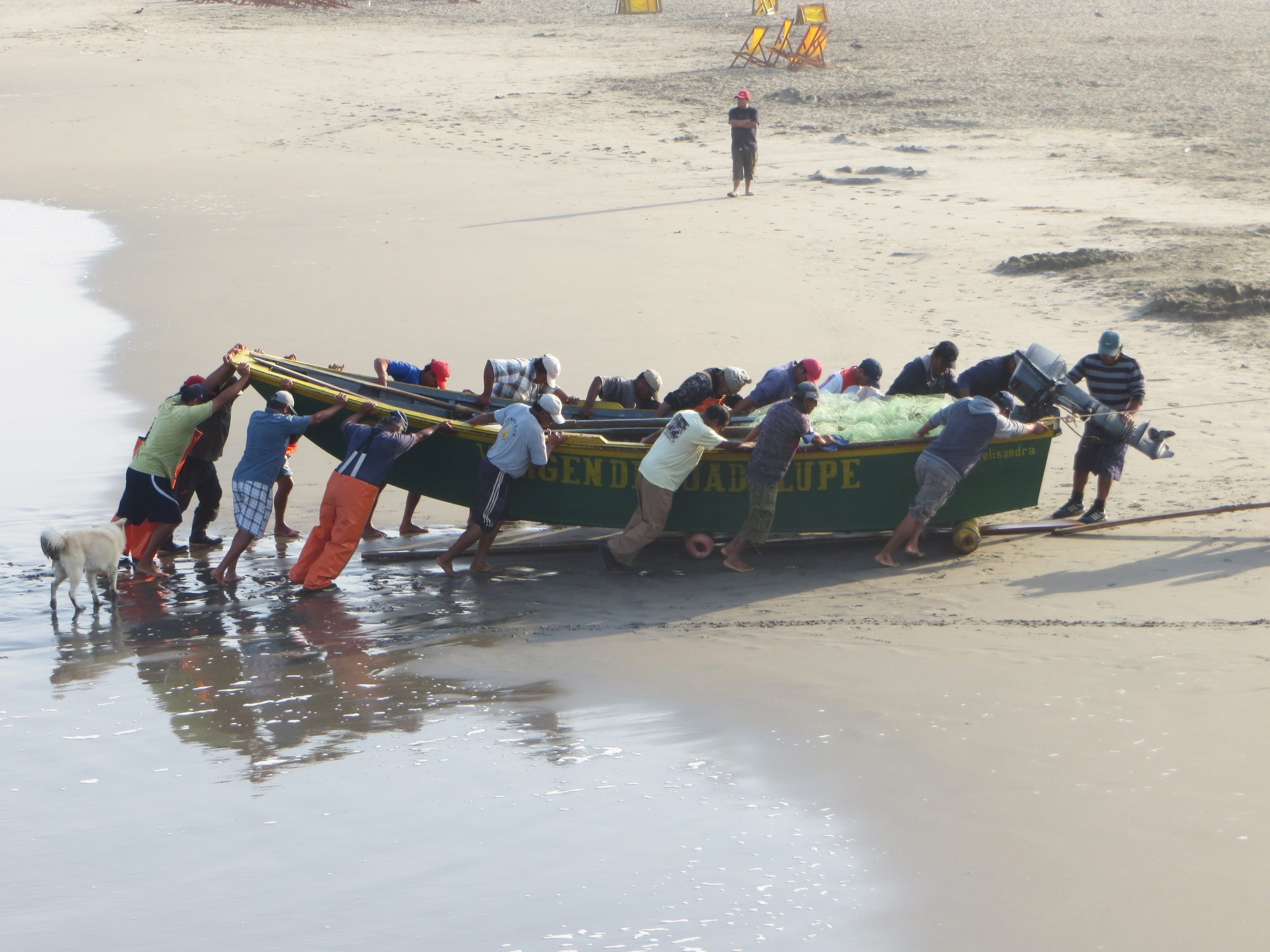
Most people work on land. Unless rocked by an earthquake, their work stations remain still. Not so for fishers. Their entire work platform rocks and rolls ceaselessly. Non-fishers cannot imagine the risks they face. Fishers work in unique conditions. There are no regular hours. On-board accommodation can be extremely cramped and unhealthy.
The difficulties don’t end when the catch is landed. Fishworkers include those in the harbours; those who process the fish and carry out post-harvest activities; those who work these into markets. Even though women carry out these activities—some even more than men—their contribution is undervalued. They work in difficult conditions, without healthcare or decent facilities, facing violence and harassment.
Trade union membership is low. Which means labour standards and legal frameworks, like those laid down by the International Labour Organization (ILO) to protect fishers, are often not to their benefit. There are also concerns worldwide about forced labour, human trafficking and exploitation of migrant labour.
ICSF has, since its inception in 1986, worked to improve the conditions of work onboard fishing vessels through legal and policy interventions. ICSF has advocated for the inclusion of small-scale fishing vessels in the ILO Work in Fishing Convention C188, which lays down binding requirements concerning work on board fishing vessels, occupational safety, health and medical care at sea and ashore, rest periods, written work agreements. ICSF has worked in partnership with FAO and ILO to address child labour issues in fishing.

Engaging with the Decent work process related to the adopted Work in Fishing Convention (WFC), 2007 has been an important part of ICSF’s work. ICSF saw engagement with the ILO process as an opportunity to focus greater attention on issues related to the conditions of work in the small-scale fisheries sector, including aspects such as safety at sea, social security, and remuneration and recognition of shore -based workers, especially women.
The International Collective in Support of Fishworkers (ICSF) Trust and the Kerala Institute of Local Administration (KILA) jointly organized a Training and Capacity Development workshop at KILA, Kerala, India on...
This study aims to look at the situation of these migrant fishers to get a better understanding of their recruitment, living and working conditions on the one hand and to...
This report on the “Sub-regional Dialogue on Labour, Migration and Fisheries Management”, held at, Thailand, from 11 to 13 December 2013, highlights the issue of migrant labour on board fishing...
This guidebook is intended mainly to help those unfamiliar with the Convention and the working of the ILO and the ILC, gain some understanding of the relevant issues. In particular,...
ICSF Guidebook: Understanding the Work in Fishing Convention, 2007 English https://www.icsf.net/wp-content/uploads/2007/09/930.ICSF119.pdf Gujarati, Marathi, Telugu, Malayalam, Hindi, Odia, Tamil, Kannada
The document gives a detailed report of the presentations and discussions transpired in the workshop. It is also worth noting that the discussions at the workshop as well as the...
The conventions and recommendations adopted by the International Labour Organization (ILO) formulate minimum international standards of basic labour rights: freedom of association, the right to organize, collective bargaining, abolition of...
This study explores the status of Brazil’s social welfare system for the fisheries sector, from the point of view of democratization of access, the methodologies used and the extent to...
Since Sri Lanka’s independence in 1948, social welfare for the country’s fishing populations has been the responsibility of successive governments. During the latter half of the last millennium, the State...
This dossier puts together reports on workshops held to discuss this proposed standard, as well as analyses of social security measures for fishing communities in the small-scale and artisanal sector...
Standing Committee Report Summary The Standing Committee on Fisheries, Animal Husbandry and Dairying (Chair: Mr. P.C. Gaddigoudar) presented its report on ‘Employment Generation and Revenue Earning Potential of Fisheries Sector’...
Cambodia’s labour migration governance framework: A comparative analysis with international labour standards for recruitment, work in fishing and forced labour. The Cambodian Government has recognized that labour migration significantly contributes...
The World Social Protection Report 2024-26 focuses on the climate crisis and the need to transition to a more sustainable world, and provides a global overview of progress made around...
Fishery stocks are declining all over the world, threatening not only the livelihoods of fisheries households and communities, but also food and nutrition security of a broader society. However, many...
This brief provides a comprehensive analysis of the latest global labour market trends. It focuses on the evolving relationship between labour and capital income, challenges facing youth in the current...
This report represents the 20th anniversary publication of the ILO’s Global Employment Trends for Youth (hereafter “GET for Youth”). As an anniversary edition, this GET for Youth looks back on...
This factsheet provides background information on the fishing industry and some of the inherent challenges of work in fishing. It aims to help professionals interested in this issue raise their...
This video is part of the “Social Protection in Rural Areas: building responsive systems in the context of Covid-19” series at the FAO e-learning academy. This session gives us an...
The UN General Assembly has declared 2022 as the International Year of Artisanal Fisheries and Aquaculture (IYAFA 2022) to enhance global awareness and promote collaboration around the theme. To provide...
The marine fisheries sector in Bangladesh, India, Maldives, and Sri Lanka, the member countries of the Bay of Bengal Programme Inter- Governmental Organisation (BOBP-IGO), plays a pivotal role in advancing...